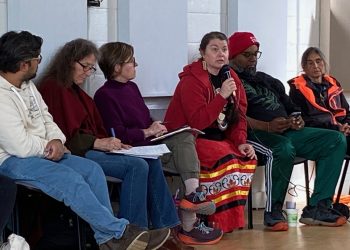Indigenous participants in Maine’s blueberry harvest might see the end of a longtime tradition with lasting impacts for Indigenous culture.
The documentary film Voices from the Barrens: Native People, Blueberries and Sovereignty screened online on Monday, Nov. 30, at 7 p.m.
The film is directed by Nancy Ghertner, a self-described “documentary film maker and teacher; immigration and indigenous rights advocate,” based in the United states. It is her second documentary.
Ghertner’s first film, After I Pick the Fruit: The Lives of Migrant Women, made in 2011, was about migrant farm workers in the United States. It took her 10 years to make as she followed the families through their seasons.
Voices from the Barrens also focuses on the seasonal workers who pick blueberries by hand in Passamoquoddy territory in Maine. However, the seasonal labourers involved in this harvest are Indigenous people from all over Wabanaki territory.
Along with the Maine Passamaquoddy and the Penobscot Nations, Indigenous people from the Maritimes have, for decades, travelled to the region to help with the harvest. Ghertner’s documentary includes interviews with participants from Elsipogtog and Eskasoni, some of whom had been participating in the harvest for half a century.
The film features beautiful cinematography by a team of three and employed two Mi’kmaq consultants: Brian Francis and Hubert Francis.
In the film, Hubert Francis, from Elpsipogtog, remembers riding in the back of a truck to Passamaqqody territory. His mother, elder Louise Francis said: “after we married, we went to Maine every year,” and remembered going for the first time when she was six or seven years old. Susie Marshall, an elder from Eskasoni, remembered picking blueberries for the first time at the age of 16.
The documentary involves a variety of participants speaking in their native languages, especially in Mi’kmaq. Brothers Alistair and Raymond Stevens, from Eskasoni, were interviewed in Mi’kmaq: “we’re losing our language, so when people gather, I also learn, people teach me.”
Most interviewees spoke of the spiritual effect of participating in the harvest, going beyond the need for income: “we are caretakers of the land,” said Plansowes Dana, a Passamaquoddy woman. The participants see their role as stewards of the land, rather than owners. Amy Maloney, from Indian Brook First Nation (Nova Scotia), stated about the harvest: “it’s like a magnet, it draws me.”
Most participants interviewed spoke of the close family atmosphere of the harvest, with people from distinct areas and nations staying in camps and mingling. They expressed disappointment and sadness with the reduction of the need for hand raking the blueberries.
In 2017, the blueberrty harvest was cancelled because of a worldwide surplus and in 2018, the harvest was reduced. By 2019, hand raking was basically eliminated in Passamaquoddy territory, in favour of the cheaper machine harvesters.
Hand harvest remains for only a few blueberry companies, in areas that aren’t flat and, thus, are more difficult to harvest.
The film discussed the historical context, focusing on the sale of land from the U.S. government to the Passamaquoddy and Penobscot people, which allowed them to buy the wild blueberry fields and create the blueberry companies that still exist today and lead in the industry.
Voices from the Barrens also quickly mentioned the United States’ honouring of the Jay Treaty of 1794 that allows free movement between the Indigenous territories in Canada and the United States. This Treaty is what governs Indigenous peoples’ travel for the harvest.
Director Ghertner and Mi’kmaw filmmaker Brian J. Francis (from Elpsipogtog) participated in a discussion after the film that was moderated by Rachel Bryant. The event was sponsored by the University of New Brunswick Saint John and Fredericton’s Faculties of Arts and Saint Stephen University.
Sophie M. Lavoie is an editorial board member of the NB Media Co-op.



![Poster exhibit remembers the two Japanese cities devastated by nuclear weapons [video]](https://nbmediacoop.org/wp-content/uploads/2025/10/image0-3-350x250.jpeg)




![Radioactivity and nuclear waste under scrutiny in Peskotomuhkati homeland [video]](https://nbmediacoop.org/wp-content/uploads/2025/10/EdwardsAkagiOct52025-1-120x86.jpg)
![Tenants target Moncton-area landlord, call for government to end ‘rent control loopholes’ [video]](https://nbmediacoop.org/wp-content/uploads/2025/10/JohnskyOct172025-120x86.jpg)
